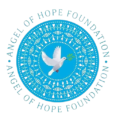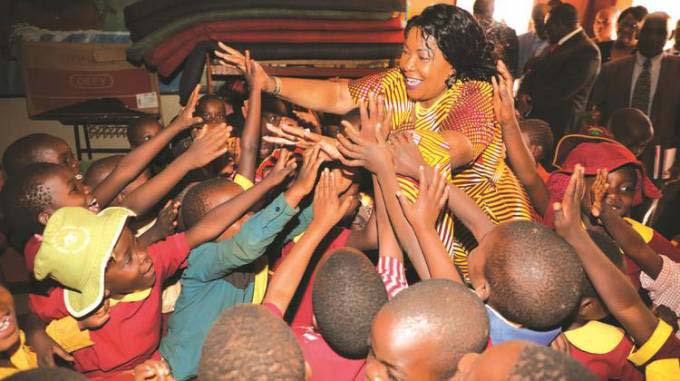Tendai Rupapa Senior Reporter
A STAR shines brighter where there is darkness, so goes an old English saying.
The saying rings true of the philanthropic work being done by Zimbabwe’s First Lady Auxillia Mnangagwa.
Through her Angel of Hope Foundation, she has done a lot of work to restore confidence in most people as she leads from the front in efforts to address poverty, hunger, disease and death which affect women, children and vulnerable communities, among others.
As Zimbabwe celebrates 40 years of independence, the country is fortunate to have a First Lady who is hands-on and takes it upon herself to ensure every citizen has access to food, shelter, education and healthcare.
Since the Month of March celebrates achievements by women in various fields, it is critical to recognise Amai Mnangagwa among the country’s living heroines. The First Lady has on many occasions shared her childhood experiences, telling Zimbabweans how she grew up in poverty and how making a difference in the lives of other people gives her joy.
Before she started her work, tales of children dropping out of school owing to poverty and hunger were published in the mainstream media.
Day in day out, it had become almost common to read about women delivering babies at home with the help of untrained midwives, exposing them and the infants to health challenges. In some instances, this led to child deaths.
Cases of adolescents turning to prostitution, drugs and early marriages to escape poverty had also become cannon fodder. But, Amai Mnangagwa has opened windows of opportunities for women and children worth celebrating. Sanitary wear provision among poor women and girls was for years a challenge, resulting in them using cow dung and other unhealthy alternatives during menstruation.
To date, she has rolled out clubs that make reusable sanitary wear for use by the poor while at the same time creating employment.
She has helped women set up nutritional gardens to achieve food self-sufficiency among communities whose members can also sell surplus vegetables to generate income.
Through her Angel of Hope Foundation, she has turned people’s despair to hope.
The previously marginalised Doma community from Kanyemba and San community from Plumtree have also benefited immensely from the First Lady’s empowerment initiatives.
These people were largely hunter gatherers, but she has assisted them start crop cultivation. She has set up a castor bean project for them and has also encouraged them to build conventional homes. The Doma community members used to construct “houses” on trees.
Through her foundation, Amai Mnangagwa also made sure that their children go to school so that they can be assured of a better future like other children across the length and breadth of the country. Expecting mothers were used to home deliveries which compromised their health and that of the newborn children. But things have now improved for the better as she has built a mothers waiting shelter for them.
So powerful have been her interventions in the Doma community that some international donors have expressed willingness to come on board to improve facilities in the area.
The last three years have been hectic years for the First Lady who has barely had time to rest, traversing the length and breadth of the country and beyond answering the motherly call to assist those in need.
In times of calamity she has offered a shoulder to cry on for those in need.
In July 2019, Amai Mnangagwa was voted vice president of the Organisation of African First Ladies for Development (OAFLAD). Accepting the honour, she pledged to take her good work to a continental scale.
“We are the mothers of our nations hence we should show commitment and work harder for our countries. I will also encourage other African First Ladies who are not members of OAFLAD to join and make sure that they be part of us.
“This is a platform where we share ideas, thereby learning from others and taking the experience back to our countries for the development of our continent,” Amai Mnangagwa said.
Unlike the usual one-size-fits-all approach usually associated with humanitarian work, Amai Mnangagwa invests time to assess people’s requirements so that she provides help that is specific to people’s needs.
Last year, the country was ravaged by Cyclone Idai which left a trail of devastation and death in Chimanimani and Chipinge, Manicaland and Masvingo Provinces, where hundreds of people were killed while property was destroyed.
To help the communities, the First Lady embarked on the “Poto neNdiro” campaign in partnership with churches. “After noticing that you were in dire need of kitchen utensils, I made a passionate plea to churches and they all heard my plea,” she explained.
She ensured that the support was not only limited to kitchen utensils and groceries, as she officiated at a ground breaking ceremony for the construction of a community hall at business centre through her social intervention’s vehicle — Angel of Hope Foundation and its partners.
The health sector is where her imprint is now indelible. The number of women being screened for cervical cancer has grown significantly since she began her active involvement in advocacy against the disease.
According to the Cancer Association of Zimbabwe, six in every 10 women are at a daily risk of cervical cancer. The First Lady has responded to the situation by making a rallying call and spearheading efforts to have women screened for cervical and breast cancer with men getting checked for prostate cancer.
Amai Mnangagwa has led the way, providing vision to women to be tested for early detection of cancer by undergoing public screening for cervical cancer at United Bulawayo Hospitals (UBH) recently. Thousands have since been tested for the disease under her inspiration.
Admirably, the First Lady who is the Health and Child Care Ambassador has devoted most of her attention to the health and well-being of the nation’s disadvantaged communities.
She is passionate about the provision of universal and adequate health services to mostly women and girls in Zimbabwe.
Amai Mnangagwa has embarked on various ground-breaking medical interventions as witnessed in Mola community, rural Kariba, where through her Angel of Hope Foundation mobilised a team of 18 medical professionals from America who partnered with local doctors to examine and treat the community for a rare ailment which has seen residents’ stomach’s swelling thereby vomiting blood leading to 20 deaths since 2009.
“When I was briefed about the disease that is affecting this community, I was touched,” she said following the successful medical project in Kariba.”
In Kanyemba she took along a medical team that offered free health services to the community. Like the Biblical Deborah, who had multiple talents and blessings to positively impact generations, the First Lady’s sterling works in promoting menstrual hygiene were recognised on a global level. She was appointed Zimbabwe ambassador for the United States-based organisation, Days for Girls (DfG).
“Being appointed the Days for Girls Ambassador for Zimbabwe allows me to advocate for girls and women around the country and to spread the menstrual health education message”, she proudly said.
This came at a time when the cost of sanitary pads has escalated and has placed the reproductive health of many young women and girls at risk of contracting cervical cancer and other genital infections.
As a way of empowering the nation and ensuring everyone had access to education, especially the girl child, the First Lady through her foundation and its partners, rolled out scholarships covering girls from different communities in all the country’s 10 provinces. The scholarships seek to stem the surge in child marriages and ensure the girl child has access to education.
Her intervention comes at a time when most underprivileged families marry-off daughters of school-going age after failing to cater for their education, exposing them to serious health challenges and abuse.
Already, this year nearly 200 pupils from Seke and Zvimba rural districts have benefited from her scholarship programme. The foundation identified 109 pupils at Maypark Primary, which is situated along Old Mazowe Road and 86 others at Simukai Primary School in Seke. Angel of Hope Foundation paid school fees for all the pupils at these schools for the whole year.
The First Lady also rolled out a nationwide school feeding programme that is targeted at addressing poor school performance due to malnutrition and hunger.
Pupils will be served healthy porridge before starting lessons and the initiative is one of the responsive strategies cushioning communities against the challenges of hunger.
Amai Mnangagwa’s works have been cutting across all sections of the society — even the heartbroken including childless couples are given hope and a shoulder to lean on.
In recognition of her nurturing approach, she was appointed ambassador for “Merck — More than a Mother” in Zimbabwe to help break the stigma associated with infertility among couples. The mother of the nation also clinched a deal with Merck Foundation to have the country’s medical personnel trained in various specialties in India.
A true mother is inclusive and lends an ear to her fellow citizens, the First Lady has done exactly that with distinction. Through Angel of Hope, the First Lady embarked on a nationwide tour, providing widows with knowledge on inheritance laws and administration of deceased estates. With assistance from officials from the Ministry of Justice, Legal and Parliamentary Affairs, Master of the High Court, Law Society of Zimbabwe, Generations Executor Services and Office of the President and Cabinet (OPC), hundreds of thousands of women were empowered through this initiative.
Beyond the country’s borders, the First Lady’s star in humanitarian interventions has continued to shine and the humanitarian development initiatives have not gone unnoticed.
She was rewarded for the work she is conducting by the Pan African Advisory which conferred her with the highly regarded Pan-African Humanitarian Award. She was also conferred with the prestigious 2019 African Phenomenal Woman of the Year Award in recognition of her philanthropic work in Zimbabwe.
In true description of the role, a mother is not selective and embraces all and she is on record emphasising that her programmes and projects are non-partisan.
Indeed, it has been an impactful three years with the first lady leading from the front in addressing social problems affecting mainly women and children, one wonders what ground she would have covered when the year 2020 ends.
Zimbabwe expects with optimism.

